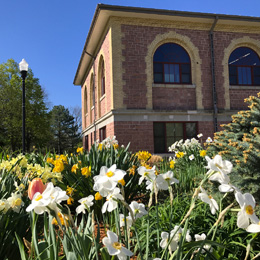DSU undergrad to chair session at China conference
January 16, 2017
“I have never been out of the country where I don’t speak the language,” said Dakota State University junior Hope Juntunen.
At the end of this semester she will not only be out of the country, but on a different continent where she will not speak any of that county’s six standard languages.
Juntunen and DSU Assistant Professor Dr. Michael Gaylor have been invited to chair a session at the 3rd International Conference on Environmental Pollution and Health, taking place in Guangzhou, China.
“I never thought…that I would be going to China,” she said, but “I’m very excited.”
“This is a pretty big deal,” Gaylor said, although it’s also a bit intimidating because it will “clearly be another world.”
Guangzhou is located in southeast China, about 75 miles northwest of Hong Kong. It is the third largest city in the Asian country, with a metro population estimated to be about 13 million.
Besides being a global travel opportunity, it’s a significant professional milestone for the Hayti, S.D. native.
“It will be just an amazing opportunity for me as an undergraduate to be involved in such an important meeting.”
Juntunen is no stranger to important scientific meetings. In November, she presented her undergraduate research work at the Society of Environmental Toxicology and Chemistry (SETAC) World Congress/North America Meeting) in Orlando.
Other scientists in attendance were some of the organizers of the China meeting. They were impressed with Juntunen’s presentation, and invited her and Gaylor to participate in their conference, which is being held May 12-14.
“This is a super big deal for us and DSU to be represented on this, really, truly world stage, and for us to get this invitation for a junior undergraduate to participate…is really a big, big deal.”
“These are the kinds of things that undergrads don’t get to do,” Gaylor said. “I can almost guarantee there will not be another undergraduate there.”
Juntunen admits the prospect is “a little overwhelming,” but organizing the session is an excellent learning opportunity. They are in the process of accepting abstracts on the theme topic, “Land-Applied Sewage Sludge Wastes: Chemical, Microbial and Plastic Constituents and Their Fates.”
In addition to the logistics work, Juntunen and Gaylor will continue their research work in advance of the China conference. By May, “We will want to have advanced this project considerably,” he said, “and will want a manuscript submitted and in review.”
The project involves working with sludge from water treatment plants in the Seattle area, Juntunen said, which is spread in the Snoqualmie National Forest northeast of the metro area.
“When it is applied, a lot of the plants and biota die,” she said, “so there’s obviously something toxic in this sludge.”
“We’re trying to figure out the volatile organic compounds and characterize that.”
It’s a common practice to land-apply sludge, Gaylor added, and is something that takes place in this area as well. The sludge may contain some essential nutrients such as nitrogen and phosphorus, but in other parts of the country, so much is dumped it “has a much more profound impact,” and “There is clearly a toxic dimension to this.”
It is not toxic to research at DSU. “[Sludge] is a great project for students to work on [in their classes,” Gaylor said, as it allows the professors to “introduce them to solving real scientific problems instead of canned, scripted things in the lab that have a right answer.”
Gaylor is proud to talk with people about their research because the Dakota State is not known for its science presence. The work of these undergraduates, however, is cutting edge, “very frontier.”
Student success with that research leads “to more students getting more excited about science,” Gaylor said, which is “a really, really special place for us to be.”

